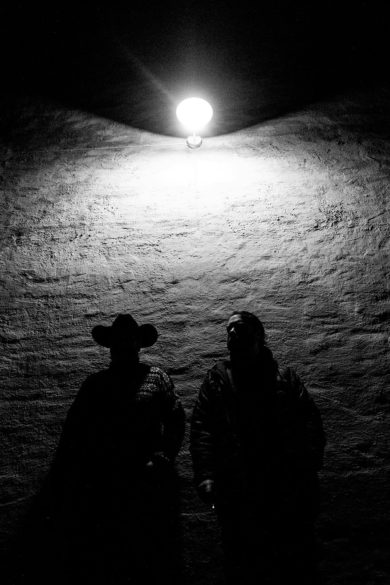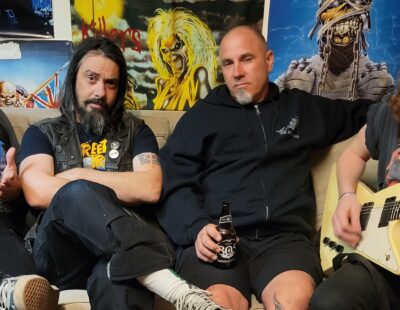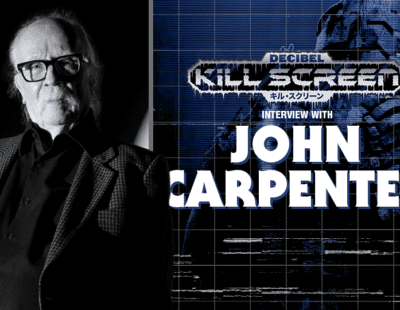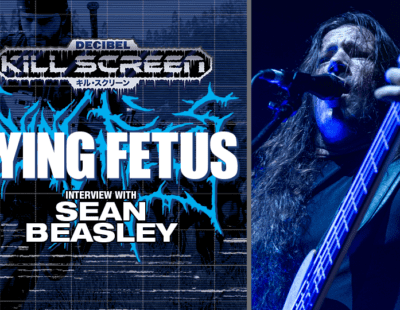
Norway’s Fleurety rarely get mentioned in the same breath as Darkthrone or Mayhem, but trace their origins back to the first seeds of Norwegian Black Metal. Founding members Svein Egil Hatlevik and Alexander Nordgaren united in 1991 and released their first demo, Black Snow, in 1993. Their first album in 17 years, The White Death, is about to be released. Hatlevik spoke to Decibel about the creation of this unique record and the song “The Ballad of Copernicus” which is streaming below.
Fleurety never fit the mold of most black metal outfits. Progressive and experimental, the band broke out of the tremolo-picked riffs and blast beat s straightjacket very quickly, and joined groups like Ulver and Ved Buens Ende on the genre’s avant-garde cutting edge. Debut album Min Tid Skal Komme explores long mellow acoustic passages with piano accompaniment and melodic guest vocals from Marian Aas Hansen.
On their sophomore LP Department of Apocalyptic Affairs metal took a backseat at times to jazz and industrial elements. Saxophone segments and a cavalcade of guests upset the influential post-black metal atmosphere the band pioneered. That record came five years after their debut, during which time Nordgaren played as a live member of Mayhem.
In the wake of the upset that record caused, the band released EPs, further tinkering with their sound. Those EP’s were collected on this year’s Inquietum compilation.
Their latest, The White Death, maintains the group’s earlier atmospheric black metal leanings, but still takes huge leaps of faith in terms of instrumentation, all the while packaging these experiments in shorter songs. Carl-Michael Eide of Virus steps in for bass and vocals more than once. Flute accompaniment from Krizia of folk-prog act Tusmorke establishes a through-line to Jethro Tull and a rarified atmosphere which still, after twenty six years of boundary-expanding, remains rare in the genre. Props, then, to Hatlevik and Nordgaren for continuing to look to the future and even after long absences never abandoning Fleurety.
So what can you tell me about “The Ballad of Copernicus”?
“The Ballad of Copernicus” is our tribute to the famous astronomer, making a point of death claiming him long before his theory of the earth not being center of the universe was widely acknowledged. The monotony of the song reflects the monotony of patient labor, the dreamy vibe is our description of years of watching the stars, trying to unlock the mysteries of how they seem to act
Fleurety and a few of its contemporary bands date back to near the origin of the Scandinavian black metal scene, but make many choices that run counter to black metal: odd time, jazz chords, non-standard instrumentation. How was it that Fleurety came to be a band which opposes the conventions of its genre?
We belong to the “no band sounds the same” early nineties generation of Norwegian black metal. What we learned as black metal kids is that your band needs identity for your existence to be justified. To say it in a caricatured way: We grew up believing that Euronymous would come at night and kill us if our music wasn’t something else, something that doesn’t already exist. I guess that’s where it all started.
What is the value in breaking from convention? Why do it when you could, say, be a band like Mayhem and probably reach many more people’s lives.
The real answer here is another case of the typical “We make the music we like”, just like every band would tell you. Breaking from convention has no intrinsic value and the real question is whether the music is good or not. We are in the business of trying to make good music, not in the business of trying to make weird music. Another point is, I guess, that The White Death is more accessible to the general music interested audience than, say, Blasphemy or Beherit. Maybe we are inaccessible from a general black metal perspective, but not so much from an overall music perspective. And I almost forgot: There are so many other factors than the sound of your music that determine how many people you reach. Mayhem serve as the perfect example; there were fatal and criminal non-musical events that took them from underground notoriety to being a household name.
Seventeen years between full lengths is a very long time. What inspired you all as musicians personally in that time?
Seventeen years is indeed a long time, so I’ll mention only one album, one that has meant a lot to me since that last Fleurety album: Zweizz & Joey Hopkins was released through Jester Records in 2011. Find it online and honor the memory of Joey Hopkins, who passed away far too early.
How do you go about writing a Fleurety song? Does it begin with a lyric or a riff or something else? And how do you take a song from that rough idea to a finished piece?
Usually there’s a riff that evolves into a song, but in recent years we’ve applied a method of making a complete drum track and adding all the others instruments on top of that. It’s very rarely lyrics first, but sometimes the lyrics determine how many repeats there will be per riff. We’re mainly a studio band, so a lot of the vocals and flutes, saxophones, vuvuzelas and kazoos are made on the fly as we record.
You recently released Inquietum, a compilation of many of your EPs, which have become quite rare. When you think about that material, what story does it tell?
Maybe it’s the story of the rebirth of a band. It starts off with a re-recording of one of the first songs we ever made and continues through a rediscovery of ourselves. Then I guess it degenerates into chaos and/or monotony, there are two paths, seemingly.
Do you prefer the EP format to LP?
The strength of the EP to us, in our situation, has been very pragmatic. We live on different continents, and we have tried to avoid becoming an Internet project. We wish to be together while making music, so it takes a while to build a catalog of songs. Releasing EPs has been a way for us to stay visible. We do prefer the LP format, mainly for practical reasons. It’s easier for a record label to make money off an album, and we’d prefer not to be a financial burden to a label.
Did you release Inquietum to ‘prepare’ people for The White Death?
Not really; it’s more due to the simple fact that things need to be done in a specific order. We wanted to compile the songs from our EPs, and we wanted to not have to think about the compilation at a time when we needed to focus our efforts on the new album.
What is the significance of the title The White Death?
That title was chosen precisely for its “blank canvas” qualities. Very basic concepts like “white” and “death”. I’ll let the audience interpret it, and I am of course waiting for some offendocrat to say it has something to do with right wing politics – which is of course wrong.
Your last album, Department of Apocalyptic Affairs, is not altogether well-regarded by many people, but others like myself quite enjoy it. What do you think of the record now nearly 20 years later?
It’s very much a child of its time; an experiment in letting go of your art and trusting guest musicians to shape the outcome. It was a one-off way of making an album, and today it sounds kinda dated, I guess. But it’s a nice curiosity, and some of the songs are quite good, I’ll have to admit that.
You have called The White Death a ‘return’ to the style of your first album Min Tid Skal Komme. The White Death however sounds very modern to me. How are these two records linked?
I wrote that sentence for the press release, and I made sure to specify that, even though it’s a “return to the style” of Min Tid Skal Komme, it’s also “more sarcastic and concise”. Maybe that accounts for things sounding modern. This time we recorded it ourselves, so we have a lot more control of how things are going to sound, as opposed to when we were teenagers and there were “adults” with an imprecise understanding of what we were trying to achieve being in charge of the recording process. We decided to let ourselves be inspired by our debut album, so from our point of view it’s a return to that style.
As always you worked with many collaborators. What is the value in musical collaboration, to you?
We’ve tried to keep the number of guest musicians to a minimum for this album. There’s basically the same band throughout the album; same drummer, guitarist and bass player. We decided we wanted an album that had more or less the same groove and sound from beginning to end. The most important value of collaboration is the surprises you get along the way, other people always add something unexpected.
When collaborating how do you keep the essence of soul of Fleurety intact?
It’s not like we’re collaborating with random people. We choose collaborators that fit with what we want to achieve. And if someone is playing something that doesn’t fit, we’ll tell them “That’s not Fleurety!”
Czral is a very talented and avant-garde musician in his own right. Virus is, like Fleurety, a very unusual act. How did you come to work together again and what did he contribute?
We’ve been buddies since we were kids, and he played the bass with Fleurety for a couple of concerts in 1995. There was also a close friendship type connection between Fleurety and Ved Buens Ende back in the day, so it just makes sense. He has a deep understanding of where we wanted to take this album, so he is in many ways just as important for The White Death as Alex or I are.
Are there any songs on the new album that you feel especially proud of?
I’d say “Future Day”. I had no idea that we could make such a beautiful ballad. It’s the biggest surprise to me from that album. Very theatrical and sentimental and it works. Who would have expected that?






